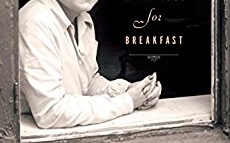In her poem “Questions of Travel,” Elizabeth Bishop asks, “What childishness is it that while there’s a breath of life / in our bodies, we are determined to rush / to see the sun the other way around?” I boarded a plane to South America last Thursday with Bishop’s poem in my canvas bag. My journey to Brazil is the latest of several cross-continental undertakings that have led me, in less than three years, to Jerusalem and Glasgow and Venice and Krakow and Budapest and New York and Berlin and São Paulo. I’m graduating in two months, still looking for a job, and utterly unconvinced that globetrotting is the answer to my most pressing questions. But I can’t stop traveling.
Perhaps my excursions into the global wilderness spring from the childishness that Bishop identifies in her poem. Bishop, a true citizen of the world, asks questions of travel that reflect years of exploration. She grew up in Nova Scotia, spent half her childhood in Boston, graduated from Vassar and traveled Europe while living in New York, moved to Key West, relocated to Brazil for 14 years, and then taught at Harvard upon returning to the States. She stayed in places long enough for wonder to pass, doubt to emerge, and wisdom to triumph.
As I travel through Brazil this week, Bishop’s voice accompanies my thoughts. I visit Iguassú Falls and remember the line she wrote about waterfalls, calling them “those streaks, those mile-long, shiny, tearstains.” The Brazilians I hear chattering in Portuguese at the beach become her “strangers in a play / in this strangest of theatres.” In Ibirapuera Park, the banyans pose at sunset, and I think of her description of trees “gesturing / like noble pantomimists, robed in pink.” All along, her questions pulse through me like a heartbeat: “Should we have stayed at home and thought of here?” “Where should we be today?” “What childishness is it…to rush to see the sun the other way around?”
Bishop’s poem arrives at a simple answer. We travel because “surely it would [be] a pity not to.” It would be a pity, Bishop writes, not to hear the “music of the fat brown bird” and not to ponder the “whittled fantasies of wooden cages.” The value in the sights, sounds, and thoughts of the traveler’s experience outweighs the value of staying at home and imagining. Marveling over Brazil’s atemoya fruits and surprising black swans, I agree with this conclusion.
But I think there is a truer answer—an answer that comes not directly from Bishop, but from the traveler who appears as a character in her poem’s last stanzas. Bishop’s traveler opens her notebook to pen the final permutation of the poem’s question: “Should we have stayed at home / wherever that may be?” Wherever that may be. Wherever “home” may be. Home, it turns out, is as uncertain as the traveler’s next destination. Perhaps the childishness, lack of imagination, and dream-chasing that Bishop links to travel is better understood as the effort to seek the familiar in the exotic, to find a home in the foreign—to become, against all conventions, a resident of the entire world.
As I ask myself what I want to do next year and where I want to be, I know that my choice of home has broadened beyond Cambridge, New England, the United States, and North America. Home can be reading on the grass by Berlin’s Museum Insel, navigating the sixteen side streets leading to the best roasted duck in Venice, or ordering carrot-coriander soup at Budapest’s newest bookstore. I like to think that it’s not childishness so much as embrace of vigor that compels my journeying. If there is something vitally human about “rushing to / see the sun the other way around,” then I want to possess that quality. And so, to answer the question of Bishop’s traveler before I close my own notebook: No. No, we should not have stayed at home, wherever that may be.
—Columnist Stephanie L. Newman can be reached at stephanienewman@college.harvard.edu.
Read more in Arts
“Lake People” Does Not Escape ConvolutionRecommended Articles
-
Calendar.Divinity School Chapel. Conference, 4 p.m. The St. Paul's Society. Sermon by the Rt. Rev. H. A. Neely, D. D.,
-
The Dudleian Lecture.The fourth and last of the Dudleian lectures was given last evening by Professor George P. Fisher, D. D. of
-
Harvard-Educated Prof. Charged With Murder of BrotherHarvard-educated biology professor Amy Bishop, who was charged with a shooting at Alabama University in February, was indicted for the killing of her brother in 1986, prosecutors announced today.
-
Harvard Ph.D. Amy Bishop Appears in Court for Allegedly Murdering ColleaguesHarvard-educated biology professor Amy Bishop, accused of murdering three colleagues at the University of Alabama in Huntsville, pleaded not-guilty by reason of mental disease or defect on Thursday.
-
 ‘Elizabeth Bishop: A Miracle for Breakfast’ More of a Four-Course Meal
‘Elizabeth Bishop: A Miracle for Breakfast’ More of a Four-Course Meal














